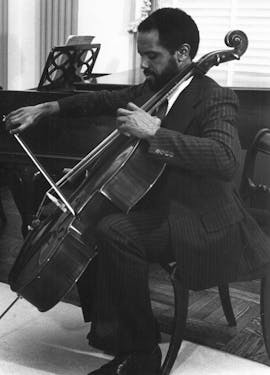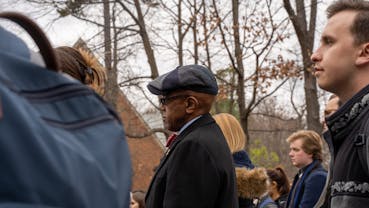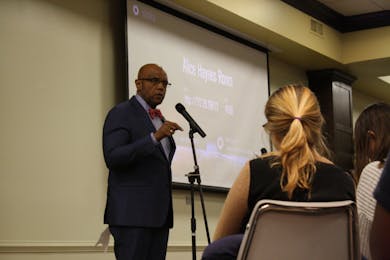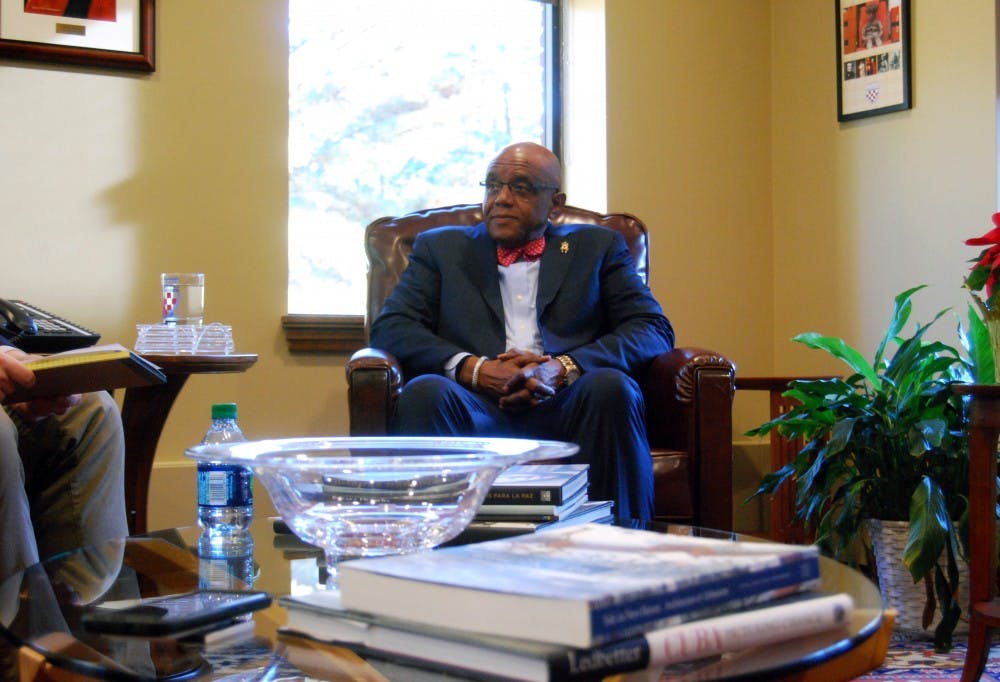A Spiders baseball cap. A bowtie. A cello on standby.
Ronald Crutcher and his signature accessories have developed some recognition both on campus and in the city of Richmond since he became the 10th president of the University of Richmond in July 2015.
Crutcher prepares to step down as president by July 1, 2022, according to a Sept. 23 email sent to the UR community. In the email, Crutcher reflected on his tenure at UR and his reasoning for asking the Board of Trustees to search for his successor.
"I conveyed at the time that I felt an extension of no longer than two years would be desirable, helpful, and appropriate," Crutcher wrote.
At the end of Crutcher's five-year term in June, Crutcher accepted the Board’s invitation to continue as president, he wrote. In his acceptance, Crutcher said he wished to serve in his position for an additional two years before stepping down, he wrote.
Before becoming president of UR, Crutcher was president of Wheaton College for 10 years and provost at Miami University for five years, according to UR's Office of the President.
But in 2023, Crutcher will return to UR to do what he loves best: teaching.
“I've not been in the classroom on a regular basis since 2005,” Crutcher said in an interview with The Collegian. "So I'm really looking forward to that.”
Crutcher will be teaching a course called Leadership and the Future of Higher Education in the Jepson School of Leadership Studies, he said. As a classical cellist, Crutcher also intends to teach a first-year seminar, he said
“I taught a first-year seminar at Wheaton College called 'From the River of Jordan to Jazz and Beyond,' which was an African American history course,” Crutcher said. “Many, many years ago, I created the first African American music course at the University of North Carolina at Greensboro.”
Crutcher and his wife, Betty Neal Crutcher, intend to take a year-long sabbatical in Berlin during the 2022-2023 school year, Crutcher said. Since Crutcher became president of UR, the Crutchers have traveled to Berlin every summer except this summer in light of COVID-19, he said.
On sabbatical, Crutcher intends to be affiliated with the American Academy of Berlin. He also intends to perform with friends whom he has not played with for 50 years, he said.
Enjoy what you're reading?
Signup for our newsletter

UR president Ronald Crutcher playing the cello at the University of North Carolina Greensboro in 1989, where he served as the associate vice chancellor for academic affairs until June 1990. Courtesy UNC Greensboro History: Spartan Stories
“Berlin is incredibly multicultural,” Crutcher said, “and then there's just so many arts and musical organizations there that you can take part in.
"As a matter of fact, it has become now the artistic mecca of Europe, replacing Paris.”
In 1972, Crutcher received a Fulbright to study in Bonn, Germany, for one year, he said. He ended up staying in Germany for almost five years, he said.
“I fell in love with the country," Crutcher said. "I lived with one family for three years. They kind of adopted me as their son. I had a great experience. So, Germany feels like a second home to me.”
Although Crutcher will not be a professor at UR until 2023, he knows exactly where he will live when he returns. In fact, in preparation of moving out of the Presidential Residence on River Road, the Crutchers bought a condominium in the Prestwould Building across from Monroe Park more than two years ago, he said.
“When we first moved here, within our first six months we fell in love with Richmond,” Crutcher said. "We had always thought that we would go back to Greensboro, North Carolina, where we lived for 11 years, but Richmond is like a bigger, more cosmopolitan Greensboro. It's closer to D.C. where our daughter lives and we just love living here. We love the quality of life.”
As the Board prepares to search for the next president, Crutcher continues to mitigate COVID-19’s impact on in-person learning.
“The saving grace for the University of Richmond is the fact that I had in place a magnificent team of folks to work with,” Crutcher said. “If I've learned anything during this period it is that it has underscored the importance of having the right people on the bus and in your leadership team. They make it possible for me to sleep well at night, really.”
Crutcher referenced actions taken by his previous university administrations during 9/11 and the Great Recession to help plan for UR’s COVID-19 procedures, he said. Reviewing these actions helped Crutcher remain calm as UR carried out remote learning in the spring and prepared for in-person learning this fall, he said.
“It helped me not to freak out,” Crutcher said. “I'll be honest with you.”
Alongside the COVID-19 pandemic, which affected students in a myriad of ways, the UR community has also faced a significant amount of social turbulence as it works to combat racism, classism and sexism on campus.

President Ronald A. Crutcher stands among the crowd at "More Than Just a Message," an open mic protest aimed at denouncing racist actions that occur on campus. The event took place on Tuesday, Jan. 28, 2020.
In January, racist graffiti written on students’ residence hall door tags rocked UR’s campus. Since the spring semester, students reported hazing incidents at both social and professional Greek life organizations in the wake of a call since July to abolish Panhellenic council and Interfraternity council Greek life. UR was also ranked by The Princeton Review as the No. 4 and No. 10 university in the U.S. with little race and class interaction in 2020 and 2021.
“When I hear, ‘Look at the Princeton Review. The report says that we're the 10th worst school in terms of race and class interaction,’ that saddens me and disappoints me,’” Crutcher said.

UR President Ronald Crutcher gives opening remarks at the community meeting on Jan. 30.
In a June 19 email to the UR community, Crutcher wrote about his reactions to the May 25 death of George Floyd and the resurgence of Black Lives Matter protests. During Crutcher’s youth, his uncle was beaten and killed by a white police officer for a crime he did not commit, Crutcher wrote in the email.
“I have been a black man in America for 73 years and have been blessed to experience many more ups than downs,” Crutcher wrote in the email. “But in the wake of Mr. Floyd’s violent death, I have found myself reliving several traumatic moments from my childhood."
Crutcher is the first Black president of UR. Since his presidency’s inception, Crutcher has put racial equity, diversity and inclusivity at-large at the forefront of his agenda, he said.
“People have to remember, we're barely one generation away from legal separation of the races,” Crutcher said. “People forget that. You know, it was legal in the early '50s, in my lifetime. I didn't encounter it, but my wife did, you know -- separate water fountains and separate accommodations.
"And so, you know, why should people question [that] most institutions are racist institutions? They are. We have to change that, obviously, but it's no surprise.”
Crutcher finds that his emphasis on social equity has become problematic because members look toward him as the "chief diversity officer," which is impossible for one person to be, he said.
“I think that there are people who are disappointed because they wanted to see change,” Crutcher said. “There are people who thought, ‘A Black president? Oh, he'll be able to change things overnight.’ A leader doesn't make that kind of change. A leader is only one person. You and your colleagues, your faculty and your staff -- they're the people who will make the change.”
UR's culture needs to change so that everyone, regardless of their background and their identity, can feel as though they belong on campus, Crutcher said.
Crutcher said he hoped to see his successor continue the work needed to make UR inclusive. Between now and July 2022, the board will hire an external executive search firm for the hiring process for UR’s next president, Crutcher said.
“The next person will come in and do a great job as well," said Keith McIntosh, vice president and chief information officer. "But I don’t envy that person because they’re going to have some big shoes to fill."
McIntosh said Crutcher was a great leader because he was a man of high integrity and drive.
“He's a straight shooter,” McIntosh said. “He genuinely cares for the University of Richmond community. He genuinely wants to see it be the, you know, the shining school on the hill that all the other schools across the country, heck, across the world, look to and go, ‘Let's do it like Richmond does.’”
There will be faculty, staff, students and members of the board on the search committee for the next president, Crutcher said. The University Faculty Senate will also submit recommend members for the search committee, he said. There will be opportunities for students to share what they would like to see in their next president, he said.
“Nobody gets these jobs just by applying for the jobs,” Crutcher said. “The institution hires an executive search firm and that executive search firm has a stable of people that they've been working with over the years.
"That's how I ended up here. An executive search firm contacted me in Berlin, Germany, and asked if I was interested in this position.”
Crutcher will be 75 years old when he steps down as president, he said.
“My father retired when he was 61 years old,” Crutcher said. “And he always told us, you know, ‘Don't stay too long. You want to have time to enjoy yourself.’ I thought, ‘75 seems like a good time to just change course, take a sabbatical and then come back and do what I love,’ which what I love is teaching.”
Crutcher has also created a president-student mentorship program, said senior Alec Greven, a member of the program since his first year at UR. The program meets regularly to discuss events happening in the United States and at UR, Greven said.
Crutcher has "been a really strong personal influence to me,” Greven said. “He had a saying that it’s really important to lead with questions and really try to look at understanding the other perspectives. That’s something I really agreed with and that has stuck with me.”
Greven and McIntosh both said they admired Crutcher’s leadership style and the legacy he would leave at UR.
“Ron is a soft-spoken guy,” McIntosh said. “He says what he needs to say in the amount of words that he needs to say. I think he carries a poise and a presence with him that we know he is the leader, but he's also very decisive about things.
“He’s a person that if you just watch and observe, you are going to learn a lot about how to be a good leader."
Features writer Alex Maloney contributed to reporting.
Contact editor-in-chief Olivia Diaz at olivia.diaz@richmond.edu.
Support independent student media
You can make a tax-deductible donation by clicking the button below, which takes you to our secure PayPal account. The page is set up to receive contributions in whatever amount you designate. We look forward to using the money we raise to further our mission of providing honest and accurate information to students, faculty, staff, alumni and others in the general public.
Donate Now



